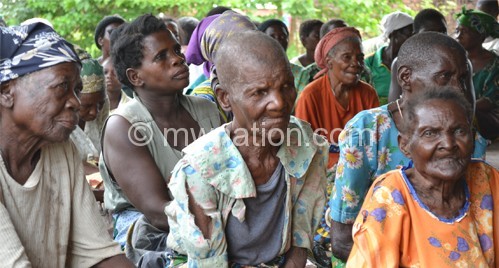Does Malawi care about elderly?

The 2004 Aged Support Society of Malawi (Assom) report made a number of recommendations for government to undertake in order to create a better world for the elderly.
Among others, the report urged government and stakeholders to formulate a policy on the aged to guide programmes aimed at mitigating the impact of socio-economic challenges that elderly people face.
The report did not just call on government to create opportunities for income-generating programmes for elderly people who are able to work.
It also urged government to find long-term solutions such as establishing a social security system to support the aged and roll out civic education to communities on the rights of elder persons to reduce the incidence of abuse of the aged.
Beyond that, Malawi, in 2006, signed the Livingstone Call for Action on Social Protection. Among the actions recommended was the call for African governments to prepare cash transfer plans within two to three years and that these be integrated into national development plans and national budgets, which development partners could supplement.
Against the background of all these recommendations, the late Bingu wa Mutharika’s administration made bold steps of redress.
For instance, the Malawi Growth and Development Strategy (MGDS), 2006 to 2011, recognised the need to address issues related to social protection of the most vulnerable, including the elderly.
As a result, government established a Ministry of Persons with Disabilities and the Elderly. Apart from including the elderly in the 2007 Pilot Cash Transfer Project, government also drafted a policy on the elderly and a policy on social protection of the vulnerable, including the elderly. The goal was to have the policy ready by 2008.
Further, Mutharika established a non-governmental organisation (NGO) called the Bingu Silver-grey Foundation for the Elderly (BSF). One of its objectives was to promote and safeguard the social security and welfare of the elderly.
Today, though the ministry is still around, a number of strides that began in Mutharika’s administration are visibly hitting a snag.
Currently, under the Bineth Trust, BSF—which in its heyday gave hope and life to the elderly in the country—is no longer active.
As it is the case with most presidential initiatives, the project lost its vigour and momentum with the death of Mutharika.
The draft Elderly and Social Protection Policy documents too are gathering dust on some shelves. The Cash Transfer Project barely includes the elderly these days.
Even the Neno Elderly Centre which government promised to build continues to stall for the sixth year now.
The sum of these negative trends has led to Malawi’s poor showing on the 2013 Global Age Watch Index which ranked Malawi sixth from the bottom. What has been the problem?
Executive director of Hope for the Elderly Thomas Pondani Mbewe says Malawi is not committed to improving the welfare of the elderly.
“Government is reluctant to promote quality life of the elderly. There is no enabling policy. The draft policy enacted four years ago is not taking off. Government claims it has no money. How can we improve quality of life without a policy?” wonders Mbewe.
However, spokesperson for the Ministry of Disability and Elderly Affairs Joshua Mkwehiwa says there is a lot that the ministry is doing to better the lives of the elderly.
“Some of older persons have been supported with capital items and in other cases, some accessed small grants to engage in small-scale income-generating activities (IGA) which include a livestock pass-on programme,” Mkwehiwa says.
He adds that they also have programmes that are aimed at raising public awareness on the rights, potentials and challenges of older persons, as well as promoting and protecting their rights.
“Some older persons require continuous support and such cases are targeted with social welfare programmes, where they have benefited from provision of food and non-food items such as vita meals, blankets, while others have their houses rehabilitated. With aging, some require rehabilitation services,” he says.
Mkwehiwa further notes that some rehabilitation service in form of provision of assistive devices such as wheelchairs and walking frames and sticks have been offered.
Just like in other ministries, Mkwehiwa underlines that funding has always been a challenge.
“The challenge is that funds may not be sufficient as required to meet the ever increasing demands of services for older persons. However, what should be known is that with whatever resources we have been funded with, the ministry has been able to reach out to older persons down at the community level,” he says.
He adds that government also encourages communities and stakeholders such as NGOs and community-based organisations to assist older persons.
On the policy, Mkwehiwa says government has a draft policy in place which was developed together with its action plan through rigorous consultations with a wide range of stakeholders.
“There are two remaining stages before it is finalised for implementation. The ministry is aware of the time it has taken to have the policy in place; as such, it is working hard to finalise the process. It is not going to take long to have this process finalised,” he says.






We need to help our ‘ Our ‘ government in help the elderly.We all live close to needy grandpas and granies.Can’t we give the little we have while waiting for the government.Think of elderly people in your village,’what is it that you are doing to improve their livingstandards?’.